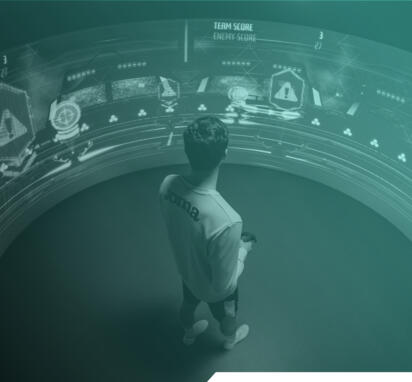Training Executive Functions
When faced with a new, difficult, and unexpected problem, we use our brain’s ability to consciously focus on a specific task and direct our thinking towards a goal-directed behaviour; known as executive functions. This area of research aims to evaluate the effect that serious gaming has on these executive functions using the latest technology and innovative tools, ranging from Tablet and PC-Gaming to immersive environments such as virtual reality. New level of intensive gaming attempts to train the general cognitive abilities of athletes in a non-sport specific context. By improving their cognitive abilities, this may positively translate into better decision-making, which in turn can improve the athletes in-game performance and their confidence in their own abilities to keep up with the cognitive demands of the game.
A secondary aim is to evaluate the influence of a new training environment called the ‘Helix Arena’, which allows for an individual to be fully immersed in a 360° environment. The effects of these training devices will be explored in both clinical and athletic populations. The aim of the Neo 360 is to assess individuals on their abilities to perceive and interact with their environment in a complex and fast paced game. The individual has teammates and opponents that are constantly moving around them, and they must play passes to teammates and score goals to be successful. The game places the individual in a stimulating environment that exercises and trains their cognitive abilities all while keeping them amused and willing to continue to challenge themselves in the game.
Training of Executive Functions via Gaming
One specific game that athletes use to train their cognitive abilities, is called the Neo 360 (see photo on the left). Before the game begins, the immersive environment attempts to creates the same feeling when athletes are stepping into an arena, and is key to athletes ‘buy in’ into the training device. The realism of the crowd roaring and reacting to success and errors in the game provides the necessary combination of crowd pressure and motivation to keep the athlete engaged to improve. Positive effects of similar cognitive training in object tracking environments have been shown to increase football players´ passing accuracy by 15 % after just 10 sessions.

Project Cooperations

skills.lab, Graz
A collaboration to design, develop then measure the beneficial effects of a fully immersive cognitive training arena on individuals' general cognitive abilities and how this transfers into real world activities; ranging from independence after a stroke to high performance sport.

Vasper Systems, California
The TSG-ResearchLab have teamed up with VASPER to evaluate a training system that uses a unique combination of blood flow restriction and cooling the body´s temperature in order to minimize the physical load of the body but positively improve the psychological benefits of exercise.
Scientific Journal Publications

EKrupitzer, C., Naber, J., Stauffert, J. P., Mayer, J., Spielmann, J., Ehmann, P., ... & Latoschik, M. E. (2022). CortexVR: Immersive Analysis and Training of Cognitive Executive Functions of Soccer Players using Virtual Reality and Machine Learning. Frontiers in Psychology, 5139.

Ehmann, P., Beavan, A., Spielmann, J., Mayer, J., Ruf, L., Altmann, S., Forcher, L., Klever, N., Rohrmann, S., Nuß, C. & Englert, C. (2022). Perceptual-cognitive performance of youth soccer players in a 360°-environment–An investigation of the relationship with soccer-specific performance and the effects of systematic training. Psychology of Sport and Exercise. https://doi.org/10.1016/j.psychsport.2022.102220

Mayer, J. & Hermann, H.-D. (2020). Kognitives Training im Sport. In J. Schüler, M. Wegner & H. Plessner (Hrsg.) Sportpsychologie. Anwendung und Grundlagen. S. 463-478. Heidelberg u.a.: Springer.

Jokiel, L., Johns, P., Spielmann, J. & Mayer, J. (2020). Verletzungsprävention im Rugby durch den Einsatz von Virtual Reality. Leistungssport 50 (5), S. 17-20.

Beavan A., Spielmann, J., & Mayer, J. (2019). Taking the First Steps Towards Integrating Testing and Training Cognitive Abilities Within High-Performance Athletes; Insights from a Professional German Football Club. Frontiers in Psychology 10(2773), pp. 1-5.




